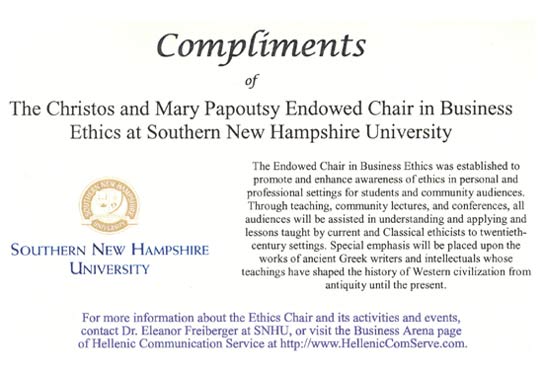
|
Εthical Guidelines
by Dr. Stanley Sfekas Some people believe that the expression “business ethics” is an oxymoron. Yet ethics has become a required course in nearly all MBA programs and is offered in undergraduate business programs as well. It was pioneered by Harvard, the University of Indianapolis, and a few other universities in the late 1970s. Why is it important? One of the core issues studied is corporate responsibility. Students study the Exxon Valdez oil spill and analyze whether the industry had any duties to the community. The Nestle scandal in Morocco is studied, in which Nestle promoted infant formula milk to Moroccan mothers by giving them free samples – this in a culture that was not familiar with the germ theory of disease. The result was a tragic number of infant deaths. Are such aggressive marketing tactics acceptable? In what ways does this case raise questions about the social and moral responsibility of corporations? Is the corporation itself a moral agent, or is it only the people in it who can properly be described as having mortal responsibility? Is Milton Friedman correct by saying the only responsibility a corporation has is to its shareholders? Or is the “broader view” of corporate responsibility held by thinkers like John Kavanaugh correct? This view holds that corporations are responsible to the community for their “externalities,” side effects of production which blight the community. It is not necessarily the nature of capitalism itself which is at the root of this problem. Capitalism has produced great philanthropists such as Carnegie and Rockefeller. But it has also given us Ivan Boesky’s comment “Greed is good” and Leona Helmsley’s “Only the little people pay taxes.” Sebastian Mallaby, commenting on current corporate scandals, writes in the Washington Post (June 11): “The scandal isn’t capitalism…it’s that capitalism has been corrupted.” Business ethics education serves as a safeguard against the development of such corruption of an individual’s moral character. Dr. Stanley Sfekas is Professor of Philosophy at the University of Indianapolis, Athens. The American Hellenic Chamber of Commerce, is a non-profit, self-supporting organization, and was established in 1932 to promote economic and business relations between the United States and Greece. With a corporate membership today of some 1,000 U.S. companies operating in Greece and major Greek enterprises doing business with the U.S., it continues to encourage and facilitate trade, investments and professional partnerships from both sides of the Atlantic. Additionally, the Chamber is a fully accredited member of the U.S. Chamber of Commerce in Washington, D.C., and affiliated with the European Council of American Chambers of Commerce (ECACC).  |
|
